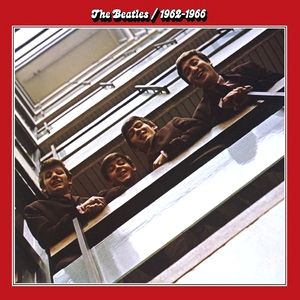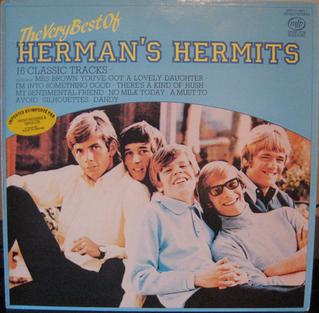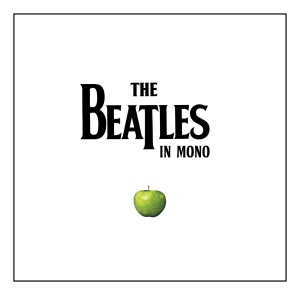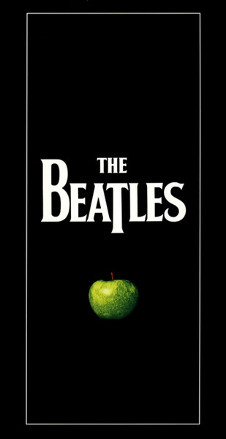This is the discography of Apple Records, a record label formed by the Beatles in 1968. During its early years, the label enjoyed a fair degree of commercial success, most notably with Mary Hopkin and Badfinger, as well as discovering acts such as James Taylor and Billy Preston who would go on to greater success with other labels. However, by the mid-1970s, Apple had become little more than an outlet for the Beatles' solo recordings. After EMI's contract with the Beatles ended in 1976, the Apple label was finally wound up. The label was reactivated in the 1990s with many of the original Apple albums being reissued on compact disc, and the company now oversees new Beatles releases such as the Anthology and 1 albums as well as the 2009 Beatles remastering programme. In 2010, Apple set about remastering and reissuing its back catalogue for a second time.

Rock 'n' Roll is the sixth solo studio album by English musician John Lennon. Released in February 1975, it is an album of late 1950s and early 1960s songs as covered by Lennon. Recording the album was problematic and spanned an entire year: Phil Spector produced sessions in October 1973 at A&M Studios, and Lennon produced sessions in October 1974 at the Record Plant (East). Lennon was being sued by Morris Levy over copyright infringement of one line in his Beatles song "Come Together". As part of an agreement, Lennon had to include three Levy-owned songs on Rock 'n' Roll. Spector disappeared with the session recordings and was subsequently involved in a motor accident, leaving the album's tracks unrecoverable until the beginning of the Walls and Bridges sessions. With Walls and Bridges coming out first, featuring one Levy-owned song, Levy sued Lennon expecting to see Lennon's Rock 'n' Roll album.

1962–1966, also known as the Red Album, is a compilation album of songs by the English rock band the Beatles, spanning the years indicated in the title. Released with its counterpart 1967–1970 in 1973, the double LP peaked at number 3 in the United Kingdom. In the United States, it topped the Cash Box albums chart and peaked at number 3 on the Billboard Top LPs & Tape chart while 1967–1970 reached the top spot. The album was re-released in September 1993 on compact disc, charting at number 3 in the UK.

A Collection of Beatles Oldies is a compilation album by the English rock band the Beatles. Released in the United Kingdom in December 1966, it features hit singles and other songs issued by the group between 1963 and 1966. The compilation served as a stopgap release to satisfy EMI's demand for product during the Christmas period, since the Beatles had only begun recording Sgt. Pepper's Lonely Hearts Club Band, the follow-up to their Revolver album, late the previous month. It was the band's first official greatest hits collection, although the Beatles had no involvement in the album.

Beatles '65 is an album by the English rock band the Beatles that was issued in the United States and Canada in December 1964. Released as the North American alternative to Beatles for Sale, it was the band's fifth studio album culled by Capitol Records in the US from the Beatles' EMI releases. The LP was also issued in West Germany on the Odeon label.

20 Greatest Hits is a compilation album featuring a selection of songs by The Beatles that were number one singles in the UK and US. It was released on 11 October 1982 in the United States and 18 October in the United Kingdom and marked the 20th anniversary of The Beatles' first record release, "Love Me Do", in the UK in October 1962. 20 Greatest Hits was the last Beatles album to be released with variations between the U.S. and UK versions. There is an extremely rare 8 track tape version of this album, of which approximately 10 to 15 copies still exist today. Legend has it that Capitol Records decided to pull the plug on the release at the last minute, as 8 tracks were not selling well in late 1982, and all copies were to be destroyed. However, there were a few that survived.

Rock 'n' Roll Music is a compilation album by the English rock band the Beatles containing previously released tracks. It was issued on 7 June 1976 in the United States, on Capitol Records, and on Parlophone in the United Kingdom, four days later. A double album, the 28-track compilation includes 15 Lennon–McCartney songs, one George Harrison composition ("Taxman"), and a dozen cover versions of songs written by significant rock and roll composers of the 1950s, including Chuck Berry, Little Richard, Carl Perkins and Larry Williams. Not counting the 1971 Spanish compilation album, Por Siempre Beatles, Rock 'n' Roll Music was the first Beatles album to include "I'm Down", which had previously only been available as the B-side of the "Help!" single.

"Paperback Writer" is a song by the English rock band the Beatles. Written primarily by Paul McCartney and credited to the Lennon–McCartney partnership, the song was released as the A-side of their eleventh single in May 1966. It topped singles charts in the United Kingdom, the United States, Ireland, West Germany, Australia, New Zealand and Norway. On the US Billboard Hot 100, the song was at number one for two non-consecutive weeks, being interrupted by Frank Sinatra's "Strangers in the Night".

Blast from Your Past is a compilation album by English rock musician Ringo Starr, released on Apple Records in 1975. It is both Starr's first compilation LP and his final release under his contract with EMI. It was also the last album to be released on the Beatles' Apple label until it was revived in the 1990s.

The Best of George Harrison is a 1976 compilation album by the English musician George Harrison, released following the expiration of his EMI-affiliated Apple Records contract. Uniquely among all of the four Beatles' solo releases, apart from posthumous compilations, it mixes a selection of the artist's songs recorded with the Beatles on one side, and later hits recorded under his own name on the other.

The Number Ones is a compilation album of hits by The Beatles released in 1983 by EMI on the Parlophone Records label in Australia. It is a localised version of the 1982 compilation album 20 Greatest Hits.

The Most of Herman's Hermits is the name of a greatest hits album released in the U.K. by EMI Records' budget label Music For Pleasure for Herman's Hermits in 1971. The title refers to the producer Mickie Most and was first used for The Most of The Animals in 1966. This album became the band's highest charting UK album, reaching #14.
Budget albums were low-priced vinyl LPs of popular and classical music released during the 1950s to 1970s consisting either of previously released material or material recorded especially for the line. Prices ranged from as low as 59 U.S. cents to $2.98. In the UK Pickwick Records' Top of the Pops record series, which operated between 1968 and 1985, was the most successful budget album range.
Top of the Pops is the name of a series of records issued by Pickwick Records on their Hallmark label, which contain anonymous cover versions of recent and current hit singles. The recordings were intended to replicate the sound of the original hits as closely as possible. The albums were recorded by a studio group comprising session musicians and singers who remained uncredited, although they included Tina Charles and Elton John before they became famous in their own right.

The Very Best of Herman's Hermits is the name of a greatest hits album released in the U.K. by EMI Records' budget label Music For Pleasure for Herman's Hermits in 1984. The album's final track on Side 2, the cover version of David Bowie's "Oh You Pretty Things" is not Herman's Hermits but Peter Noone solo from 1971. EMI licensed the song for this LP from RAK Records. The cover uses the same photograph as earlier MFP compilation The Most of Herman's Hermits.
David Edwin Dexter Jr. was an American music journalist, record company executive, and producer known primarily for his long association with Capitol Records. He worked with many important figures in jazz and traditional popular music, including Count Basie, Peggy Lee, Duke Ellington, and Frank Sinatra. Dexter is also known for his role in Capitol's turning down the early singles by the Beatles as well as his subsequent decisions regarding their packaging, and his sometimes altering their recordings for the American market.
The Beatles experienced huge popularity on the British record charts in early 1963, but record companies in the United States did not immediately follow up with releases of their own, and the Beatles' commercial success in the US continued to be hampered by other obstacles, including issues with royalties and public derision toward the "Beatle haircut".

The Beatles in Mono is a boxed set compilation comprising the remastered monaural recordings by the Beatles. The set was released on compact disc on 9 September 2009, the same day the remastered stereo recordings and companion The Beatles were also released, along with The Beatles: Rock Band video game. The remastering project for both mono and stereo versions was led by EMI senior studio engineers Allan Rouse and Guy Massey.

Let's Face the Music is the sixth Shirley Bassey studio album, released in 1962 and arranged by Nelson Riddle. Kenneth Hume, Shirley Bassey's husband and manager, wrote the sleeve notes for this album, in which he gives an insight into how this album came to be: "When Vic Lewis booked Nelson Riddle for a tour with Shirley, we were all very excited; being great fans of Nelson Riddle's from way back...so when someone suggested them doing an LP together, we thought that this would not be possible, remembering that Nelson was under contract with another recording company." Nelson Riddle was under contract to Capitol Records at the time, so Bassey's producer Norman Newell went about to secure his services for an album. While on the tour, Bassey, Riddle, and Bassey's music director Raymond Long, discussed what form the album should take. Shortly after the tour was completed, the recording sessions began.

The Beatles (The Original Studio Recordings), also known as The Beatles: Stereo Box Set, is a box set compilation comprising all remastered recordings by English rock band the Beatles. The set was issued on 9 September 2009, along with the remastered mono recordings and companion The Beatles in Mono and The Beatles: Rock Band video game. The remastering project for both mono and stereo versions was led by EMI senior studio engineers Allan Rouse and Guy Massey. The Stereo Box also features a DVD which contains all the short films that are on the CDs in QuickTime format. The release date of 09/09/09 is related to the significance to John Lennon of the number nine.














